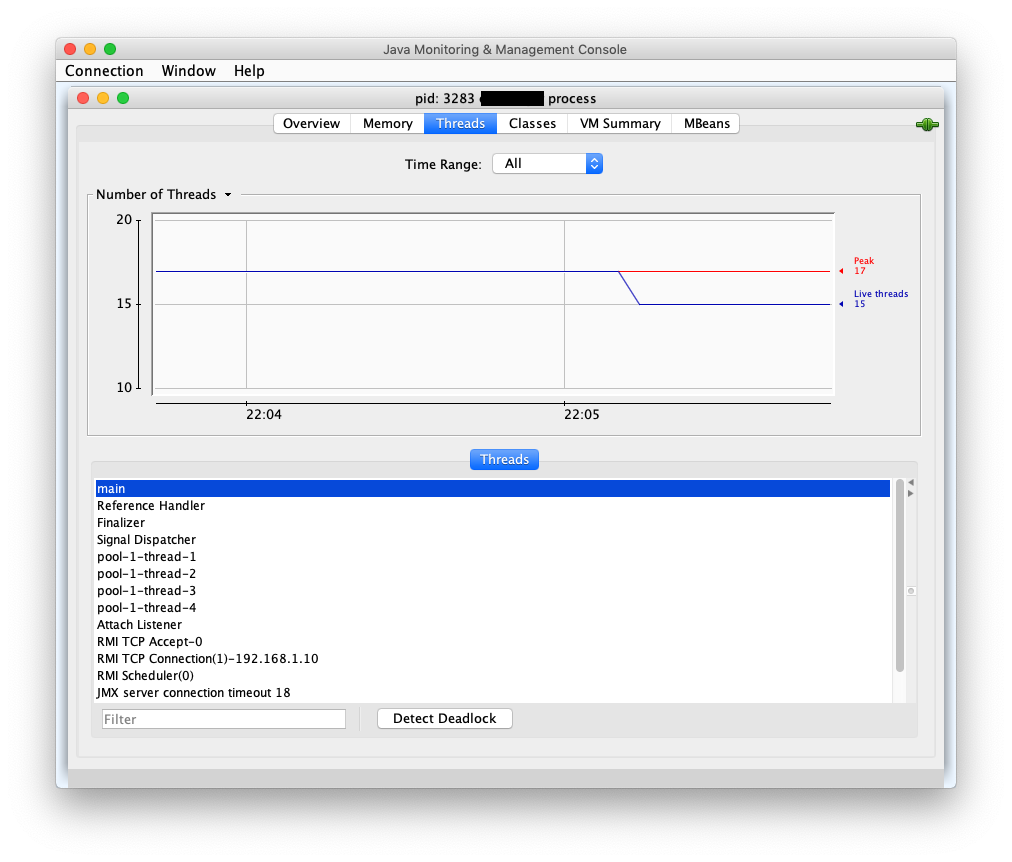Overview
Recently, I used thread pool to do intensive computation. I’ve 11G of raw data
stored as files and I need to extract information from it as fast as possible.
As you can imagine, using Java concurrency correctly become important in use
case. This article explains how I use ExecutorService#invokeAll() method to
use 100% CPU effortlessly.
Note that this article only covers the case where all tasks are defined before getting started and no new task is added during the execution. Java 8 is used.
Create Thread Pool
Before the computation, create a thread pool that reuses a fixed number of
threads operating off a shared unbounded queue. At any point, at most nThreads
threads will be active processing tasks. If any thread terminates due to a
failure during execution prior to shutdown, a new one will take its place if
needed to execute subsequent tasks. The threads in the pool will exist until it
is explicitly shutdown().
In my case, I use exactly the same number of threads as the number of processors available to the Java virtual machine. It allows to have one thread per processor, so that thread switching can be avoided.
int nThreads = Runtime.getRuntime().availableProcessors();
ExecutorService threadPool = Executors.newFixedThreadPool(nThreads);
Note that the number of available processors in JVM is the number of logical CPUs in your machine. You can check it using the following commands.
Linux:
$ lscpu | grep -E '^Thread|^CPU\('
CPU(s): 4
Thread(s) per core: 2
Mac OS:
$ sysctl hw.physicalcpu hw.logicalcpu
hw.physicalcpu: 2
hw.logicalcpu: 4
Windows:
>echo %NUMBER_OF_PROCESSORS%
4
Submit Tasks
ExecutorService accepts a collection of Callable<T> as input for method
invokeAll():
<T> List<Future<T>> invokeAll(Collection<? extends Callable<T>> tasks)
throws InterruptedException;
So you should create a class (separated, anonymous, or lambda) which implements
the Callable<T> interface. Then, submit them into thread pool. Here’s what I
did (simplified):
public class MyTask implements Callable<MyResult> {
private final Path path;
public MyTask(Path path) {
this.path = path;
}
@Override
public MyResult call() {
...
}
}
// prepare
List<MyTask> tasks = new ArrayList<>();
while (!paths.isEmpty()) {
Path = paths.poll();
tasks.add(new MyTask(p));
}
// invoke
List<Future<MyResult>> futures = threadPool.invokeAll(tasks);
During Execution
If you want to monitor the execution progress, there’re several ways to do it.
Watch the logs. You can watch the logs. Each log
entry has a thread name, and from there you can know which task is being
executed by which thread. By default, the thread name created by default thread
factory (java.util.concurrent.Executors.DefaultThreadFactory). It starts with
“pool-N” and follows by “thread-M”, where N is the sequence number of this
factory and M is the sequence number of the thread created by this factory.
"pool-${N}-thread-${M}"
For example:
2019-01-29 21:54:22.172 [pool-1-thread-4] INFO MyTask - ...
2019-01-29 21:54:22.172 [pool-1-thread-3] INFO MyTask - ...
2019-01-29 21:54:22.172 [pool-1-thread-1] INFO MyTask - ...
2019-01-29 21:54:22.172 [pool-1-thread-2] INFO MyTask - ...
2019-01-29 21:54:22.331 [pool-1-thread-3] INFO MyTask - ...
2019-01-29 21:54:22.352 [pool-1-thread-2] INFO MyTask - ...
2019-01-29 21:54:22.364 [pool-1-thread-1] INFO MyTask - ...
I’m using Log4J, and the conversion pattern is the following, where %t
represents the thread name:
%d{yyyy-MM-dd HH:mm:ss.SSS} [%t] %-5p %c{1} - %m%n
Using JConsole. From your terminal, use command jconsole to open JConsole
(Java Monitoring & Management Console). Then connect to the specific JVM using
its process ID (PID). If you don’t know it, use jps to find it out. Once
connect, go to tab “Threads” and you will see the detail about threads.

Using JStack. From your terminal, use command jstack <pid> to do a thread
dump, which allows to understand what happens at the moment T.
Completion: All Tasks Done
Thread pool returns a list of Futures holding their status and results when all
complete. Future#isDone is true for each element of the returned list. Note
that a completed task could have terminated either normally or by throwing an
exception. The results of this method are undefined if the given collection is
modified while this operation is in progress.
List<Future<MyResult>> futures = threadPool.invokeAll(tasks);
You can perform post-actions by retrieving result T from Future<T>. For
example, analyse the results of all futures: how many tasks were successful,
how many were failed etc.
for (Future<MyResult> future : futures) {
if (!future.isCancelled()) {
try {
MyResult r = future.get();
// TODO: Add post-invoke logic
} catch (ExecutionException e) {
logger.error("Failed to get result", e);
} catch (InterruptedException e) {
logger.error("Interrupted", e);
Thread.currentThread().interrupt();
}
}
}
Shutdown
After having processed all the tasks, you need to shutdown the thread pool
manually in your code. Method shutdown() initiates an orderly shutdown in
which previously submitted tasks are executed, but no new tasks will be
accepted. Invocation has no additional effect if already shut down.
threadPool.shutdown();
This method does not wait for previously submitted tasks to complete execution
(use awaitTermination() to do that). However, in our case, it’s fine because
invokeAll() guarantees that all tasks are done before returning the results.
Conclusion
In this article, we saw how to create a fixed thread pool, submit tasks, invoke all tasks, monitoring the execution, perform post-action and shutdown the thread pool. Hope you enjoy this article, see you the next time!
References
- Oracle n.d., ExecutorService (Java Platform SE 8), viewed 29 January 2019, https://docs.oracle.com/javase/8/docs/api/java/util/concurrent/ExecutorService.html
- Oracle n.d., Executors (Java Platform SE 8), viewed 29 January 2019, https://docs.oracle.com/javase/8/docs/api/java/util/concurrent/Executors.html
- Mr ASquare 2015, How to know number of cores of a system in Linux?, viewed 29 January 2019, https://unix.stackexchange.com/questions/218074
- Mike DeSimone 2009, How to discover number of logical cores on Mac OS X?, viewed 29 January 2019, https://stackoverflow.com/questions/1715580
- Mustafa 2014, Find Number of CPUs and Cores per CPU using Command Prompt, viewed 29 January 2019, https://stackoverflow.com/questions/22919076